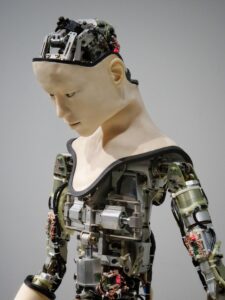The Ethics of Artificial Intelligence at the Intersection of Original Writing
The other day Pastor Doran, Kyle Dunham, and I were discussing the advent of AI technology. Of course, AI has been around for some time, but its modern uses appear to be multiplying at an astonishing pace. One of the uses has me wondering how others think of the morality of using the technology.
The portal to one iteration of AI is through a website (Quillbot.com). Quillbot is a self-proclaimed “paraphrasing Tool.” Just input any text, and the AI rearranges the material and substitutes words and even grammatical elements. Though the site suggests its main use would be for someone to improve their own writing, the idea that it “paraphrases” and the fact that the site has a built-in plagiarism detector, suggests that its main use may be the painless rearrangement of material for immediate reuse in papers. Instead of the difficult work of understanding and then putting an author’s words into your own words, this tool allows students to automate the process.
Let me give just a few examples of the tool in use.
Example 1: Wayne Grudem, Systematic Theology, 226.[1]
ORIGINAL: “Sometimes people think the doctrine of the Trinity is found only in the New Testament, not in the Old. If God has eternally existed as three persons, it would be surprising to find no indications of that in the Old Testament. Although the doctrine of the Trinity is not explicitly found in the Old Testament, several passages suggest or even imply that God exists as more than one person.”
PARAPHRASED: “Some individuals mistakenly believe that the doctrine of the Trinity can only be found in the New Testament and not the Old. It would be unexpected to discover no references to God existing in three people for all of eternity in the Old Testament. Several texts in the Old Testament infer or even expressly state that God is more than one person, despite the theology of the Trinity not being mentioned there.”
Example 2: Karen Jobes, 1 Peter, 87.
ORIGINAL: “Such could never happen to them again in their new home in Christ’s kingdom, into which they have been born again. Jewish or Gentile Christians, if expelled from their place of residence, have experienced life-shaking economic and social upheaval. However, now their new inheritance is secure, for it is even now being kept “in heaven” for them, far beyond the reach of the events of this world.”
PARAPHRASED: “In their new home in Christ’s kingdom, into which they have been born again, such could never take place to them again. If Jewish or Gentile Christians were forcibly removed from their homes, they would go through a life-altering economic and social turmoil. However, as of right now, their new inheritance is safe since it is being preserved “in heaven” for them, free from the influence of worldly events.”
Assessment
If I had just read Grudem or Jobes, I likely would sense the use of their material. The chances that I would have just read their material approaches zero, however. And classic plagiarism software (the type that searches for copied material) would likely fail to recognize the borrowing. In sum, I think this would work to fool me.
On the other hand, this is not perfected material (and I wonder if it ever can be?). As you can see, particularly in the second example, the AI misunderstood Jobes’s point, albeit slightly. Jobes was not saying that expelled Christian sojourners would go through difficulty but that they have gone through difficulty. Further, the nuance of “as of right now” is different than the nuance of the simple “now,” and I am sure Jobes would object to the modification. It is not like the audience’s inheritance is secure only for the moment.
Conclusion
The questions I want to pose to our audience are these:
- Does the use of this software amount to plagiarism?
- Can you see a good use for this software?
- Related to the last point, can you think of a place you could use this presently?
[1] Note the reference, lest I be accused of plagiarism in a post about potential plagiarism!




It is plagerism. Even if one wishes to parse definitions, the spirit of the whole enterprise (and certainly the letter of the moral intent of using this tool) is plagerism. There is no good use for the tool, and I would never use it.
I might run something I have already written through it and see if it suggests some useful edits.
1. It’s only plagiarism if I fail to give due credit. Is it difficult to detect plagiarism in an AI-generated paraphrase? Sure, but a thoughtful human-generated paraphrase presents the same difficulty.
2. There’s nothing inherently virtuous about laboring for hours trying to vary syntax or find the perfect synonym when a tool like this can quickly provide options for the judicious editor. Why not save the edit time and focus more on original research and concise argumentation?